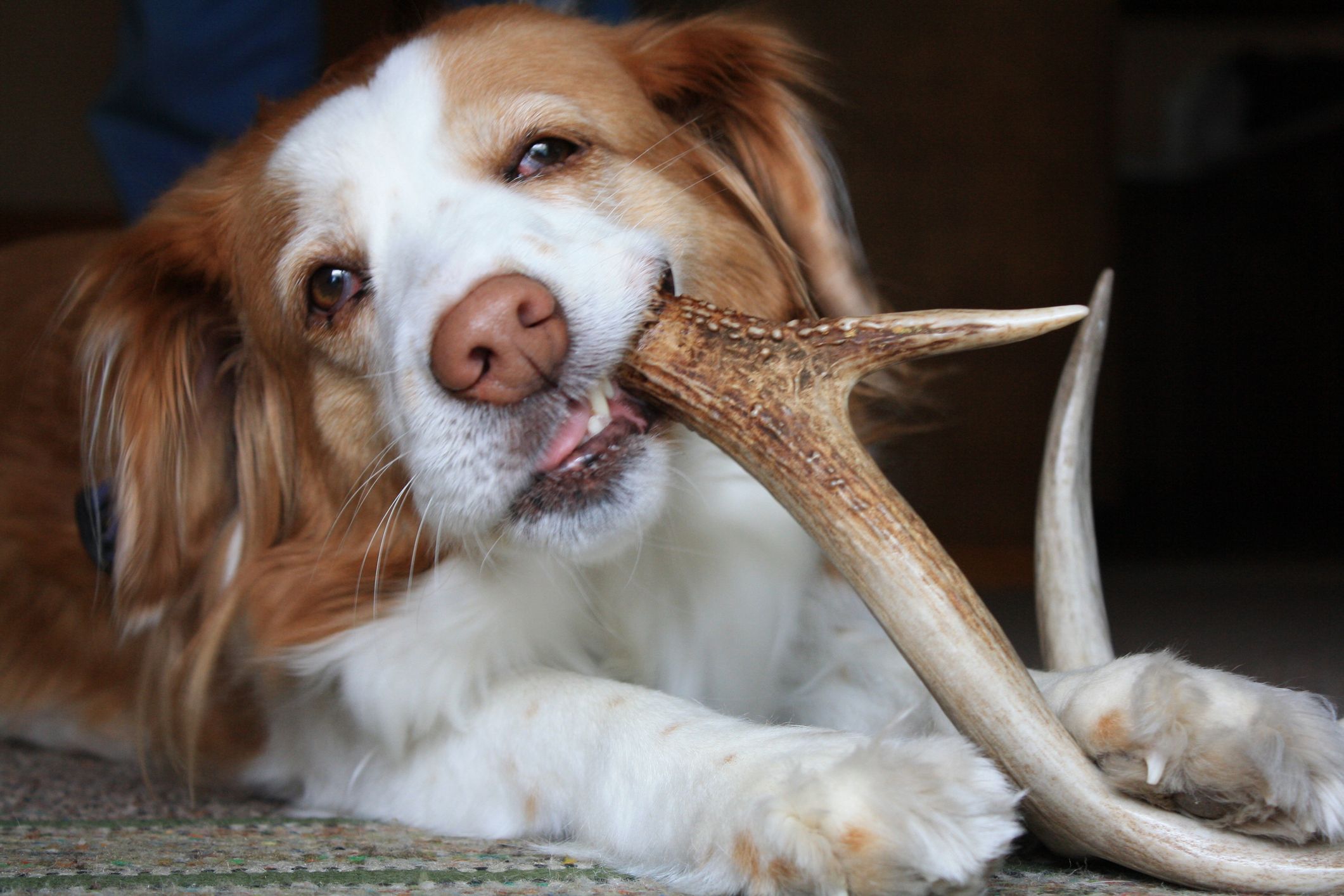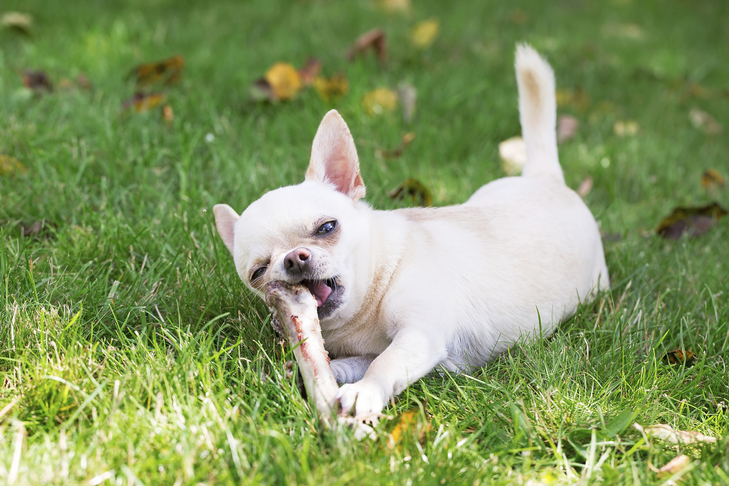AKC is a participant in affiliate advertising programs designed to provide a means for sites to earn advertising fees by advertising and linking to akc.org. If you purchase a product through this article, we may receive a portion of the sale.
Dogs love chewing on bones and antlers. This fact is reinforced in cartoons, the media, advertising, and even in our speech. But are antlers for dogs safe to chew?
On the surface, antlers for dogs seem like the perfect object for our pets to chew on. Antlers do not appear to splinter as easily as bones or other toys. They last a long time, saving you money on chew toys for powerful chewers. They also appeal to our sense of what is “natural” for our dogs.
However, antlers can pose some hazards that you should consider before you buy the antler treat you’ve been eyeing at the pet store.
Have you ever watched your fur baby gnawing enthusiastically on a bone and thought “this seems right”? After all, dogs and bones go together like peanut butter and jelly, right? Well, the world of dog chews has expanded beyond simple bones, and deer antlers have become increasingly popular among pet parents But the burning question remains can dogs chew on real deer antlers safely?
As a dog owner myself, I’ve wondered about this too. That’s why I’ve dug deep into what veterinarians and experts say about these natural chews. What I discovered might surprise you!
What Are Antler Dog Chews?
Before diving into the safety aspect, let’s understand what we’re talking about. Antler chews for dogs come from naturally shed antlers of deer, elk, or moose. Unlike horns, antlers are shed annually and regrow, making them a renewable resource.
Different types of antler chews include
- Deer antlers – Generally harder in texture and available in various sizes
- Elk antlers – Usually larger and can be found in split form with varying density
- Moose antlers – Softer than other varieties and often sold in different slices and shapes
- Split antlers – Cut lengthwise to expose the softer inner core
Many pet stores now offer these antlers in different sizes to accommodate dogs of all breeds, from tiny Chihuahuas to massive Great Danes.
The Appeal of Antlers for Dogs
It’s easy to see why antlers have become so popular among dog owners:
- They’re natural and free of chemicals or additives
- They last much longer than many other chew toys
- They don’t splinter as easily as bones
- They seem to satisfy a dog’s natural urge to chew
- They’re odorless (unlike some other natural chews)
- They’re marketed as helpful for dental health
But are they actually safe? That’s where things get complicated.
The Controversial Truth About Antlers for Dogs
Despite their popularity, there’s significant disagreement among veterinary professionals about whether antlers are safe for dogs. Let’s look at both sides of the argument:
Arguments For Antler Chews
Some proponents believe deer antlers can be safe for heavy chewers. They are known for their durability and toughness, making them suitable for dogs who are aggressive chewers or have a strong chewing instinct. Supporters point to these benefits:
- They help reduce plaque and tartar buildup
- They provide mental stimulation
- They’re a sustainable alternative to plastic toys
- They’re less likely to cause digestive issues than rawhide
Arguments Against Antler Chews
However, most veterinarians—especially veterinary dentists—strongly advise against giving dogs antlers to chew. Here’s why:
-
Risk of tooth fractures – Antlers are extremely hard and can cause painful slab fractures in dogs’ teeth. These fractures expose nerve endings and can lead to abscesses and infections.
-
Potential for splintering – Though less prone to splintering than bones, antlers can break into sharp pieces that might cause:
- Mouth injuries
- Throat damage
- Intestinal blockages or perforations
-
Bleeding gums – The hard surface can cause gum irritation and bleeding
In fact, an informal poll of over 1,000 veterinarians revealed that 93% did not recommend letting dogs chew on antlers, while less than 1% thought they were completely fine.
The Dental Danger of Antlers
Perhaps the biggest concern with antlers is dental damage. Dr. Julie Buzby, an integrative veterinarian, explains that broken teeth are extremely painful for dogs and can lead to serious complications:
- Exposed nerve endings cause continuous pain
- Infections can develop at the fracture site
- Tooth root abscesses may form and even rupture through the face
- Dental repairs typically cost hundreds of dollars
One study found that one in four animals presented for dental cleaning have traumatic dental injuries, with 50% of those injuries being fractured teeth. Many of these fractures come from chewing on objects that are too hard—like antlers.
The “Kneecap Test” for Dog Chews
Veterinary dentist Dr. Fraser Hale offers a simple rule of thumb for determining if a chew toy is too hard for your dog:
“If a chew toy or bone is too hard to smack into your own kneecap, then it’s too hard to give your dog to chew.”
Using this test, antlers would definitely be considered too hard for most dogs.
But My Dog LOVES Antlers!
I get it. My neighbor’s Lab goes absolutely bonkers for his antler chew. And many pet owners report that their dogs have chewed antlers for years without any problems.
However, just because a dog hasn’t experienced dental damage yet doesn’t mean it won’t happen. It’s similar to driving without a seatbelt—you might be fine for years, but that doesn’t make it safe.
As Dr. Emily Baldwin, a veterinary dentistry resident, puts it:
“Every dog who ever chewed an antler didn’t absolutely fracture a tooth. However, every person who drives a car doesn’t get in an accident either. We know that this is a risk every time we get in a car, just like we know chewing antlers risks tooth fractures.”
What About Split Antlers?
Some companies offer split antlers, which expose the softer inner core. While these might seem like a safer alternative, they still pose significant risks. The outer portion remains extremely hard, and even the inner portion is harder than what veterinary dentists recommend.
Safer Alternatives to Antler Chews
If you’re now wondering what your pup CAN safely chew on, don’t worry! There are plenty of veterinarian-approved alternatives:
Recommended Chew Toys:
- Kong toys (can be filled with treats or peanut butter)
- Zogoflex toys by West Paw
- Planet Dog rubber toys
- GoughNuts chew toys
For the most up-to-date recommendations, check the Veterinary Oral Health Council’s list of accepted products at vohc.org.
Other Chews to Avoid:
Similar to antlers, these chews are also considered too hard and potentially dangerous:
- Nylon bones
- Large rawhides
- Hooves
- Non-processed large bones
Signs Your Dog May Have Damaged a Tooth
If your dog has been chewing on antlers, be alert for these warning signs of dental damage:
- Reluctance to chew or eat
- Dropping food while eating
- Excessive drooling
- Bad breath
- Bleeding from the mouth
- Pawing at the face or mouth
- Swelling on one side of the face
If you notice any of these symptoms, contact your veterinarian right away.
What About Puppies and Antlers?
Puppies are especially vulnerable to dental damage because their teeth are still developing. Additionally, they’re learning chewing habits that will last a lifetime. It’s best to start them off with appropriate chew toys rather than developing a taste for items that could harm them.
My Personal Experience
I’ll be honest—I used to give my German Shepherd mix antlers to chew. He loved them and would spend hours gnawing contentedly. I thought I was doing him a favor by giving him something natural and long-lasting.
Then I noticed a small chip in one of his canine teeth. My vet confirmed it was likely from chewing something too hard. The guilt was real, y’all! I immediately tossed all the antlers and switched to more appropriate chew toys.
Lesson learned: just because something is natural doesn’t mean it’s safe. And just because your dog enjoys something doesn’t mean it’s good for them (my dog would also happily eat an entire chocolate cake if given the chance, but that doesn’t make it a good idea!).
The Bottom Line on Antlers for Dogs
After reviewing all the evidence and expert opinions, the conclusion is clear: most veterinarians strongly advise against giving dogs antlers to chew, regardless of whether they’re from deer, elk, or moose.
While deer antlers can be safe for some heavy chewers, the risks—especially of painful tooth fractures—generally outweigh any potential benefits. The American Veterinary Dental College also takes a stance against antlers as dog chews.
Remember, your dog can’t tell you when they’ve cracked a tooth, and they’ll often continue chewing despite the pain. As responsible pet parents, it’s up to us to make the safest choices for our furry friends.
Frequently Asked Questions
Q: Can antlers help clean my dog’s teeth?
A: While chewing can help reduce plaque, any potential dental benefits of antlers are far outweighed by the risk of tooth fractures. There are safer ways to maintain your dog’s dental health.
Q: What if I supervise my dog while they chew the antler?
A: Even with supervision, tooth fractures can happen in seconds. Supervision might help prevent choking or ingestion of pieces but won’t prevent dental damage.
Q: Are split antlers safer than whole antlers?
A: Split antlers are still too hard for dogs to chew safely. They may expose the softer inner core, but the outer portion remains dangerously hard.
Q: What about antlers for dogs with pancreatitis who need low-fat chews?
A: While antlers are low in fat, the risks still outweigh any potential benefits. Consult your veterinarian for safer low-fat chew options.
Q: My dog has been chewing antlers for years with no problems. Should I still be concerned?
A: Yes. Dental fractures can happen at any time, and some may not be immediately visible. Just because a problem hasn’t occurred yet doesn’t mean the risk isn’t real.

Antlers for Dogs and Dental Health
Perhaps the biggest irony when it comes to hard chews like antlers is that we, as owners, believe we are helping to keep our dogs’ teeth clean. After all, chewing helps reduce plaque and tartar buildup, and it also redirects destructive tendencies and anxiety into an acceptable outlet. For owners of powerful chewers that destroy conventional chew toys in a manner of hours, antlers may seem like a gift from nature herself.

You should consider, though, that antlers and other excessively hard chews are a common cause of broken teeth in dogs. Broken teeth are extremely painful and can lead to abscesses and infections. While your dog’s suffering is usually enough of a reason to avoid hard chews, a broken tooth typically costs hundreds of dollars in repair or removal.
Types of Antler Chews for Dogs
Natural antler dog chews can come from a variety of sources. Each type has different textures. Deer antlers for dogs can have a harder texture than other varieties of antlers. They come in a wide range of sizes, so you can select the right fit for your dog’s size and chewing behavior.
Elk antlers for dogs are usually large in size, and can often be available in a split form. Elk antlers vary in density, depending on which part of the antler is selected. Moose antlers for dogs are softer than other antlers, and are often sold in different slices and shapes to choose what works for your individual dog. You can even find other types of “antler” chews that are made from water buffalo horns.
